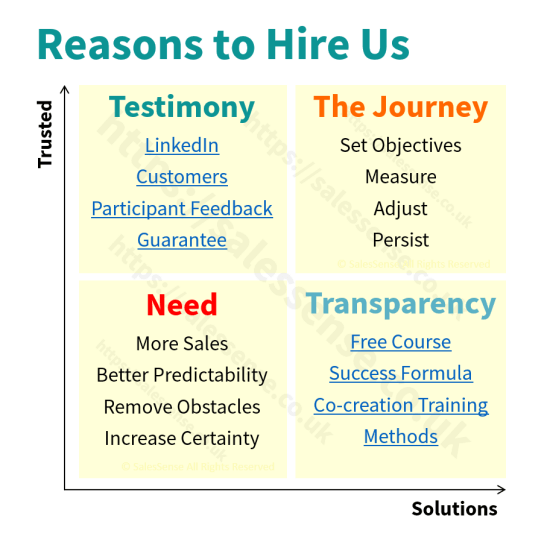How to choose the right B2B sales courses.

Mastering B2B sales skills is essential for professionals aiming to excel in the sales domain. This guide offers a comprehensive overview of choosing the right B2B sales courses. How to choose a course that aligns with your career goals and enhances your professional toolkit.
How to learn B2B sales?
Whether you are new to sales or looking to refine your skills with advanced techniques, this article will help you navigate the myriad of options available, ensuring you choose a course that meets your learning objectives, fits your preferred learning style, and suits your schedule.
From understanding course formats and content to evaluating instructor credentials and course accreditation, each section is designed to equip you with the knowledge to make an informed decision and invest wisely in your professional development.
B2B Sales Courses - Selection Guide
1. Define Your Learning Objectives
Before researching the plethora of B2B sales courses available, it’s essential to determine what you want to achieve through the training. Whether it's improving interpersonal communication skills, learning advanced selling techniques, or understanding B2B marketing better, your goals will guide your choice. Some courses offer specialised training for specific roles or industries, which might be advantageous depending on your career focus. Take some assessments if you are unsure how to decide on learning objectives. See our range of free sales assessments here.
2. Course Format and Flexibility
The format of the course—whether online, in-person, or hybrid—can affect your learning experience. Online courses offer complete flexibility and are suitable for those who are good at learning by themselves. In contrast, in-person sessions can provide a richer interaction. These days, some courses can be taken through one-to-one virtual classroom sessions with the trainer. This offers the benefits of flexibility and in-person tutoring. Traditional classroom training is still widely available and may be suitable for those with more time and travel flexibility.
3. Course Content and Structure
Look for courses that cover essential topics such as prospecting, pipeline management, client relationship management, sales process management, and negotiation. Some courses might also offer insights into the psychological aspects of sales. Look for courses that reflect today's best practices and are regularly updated to include emerging methods, techniques, and technologies.
4. Instructor Expertise and Support
The quality of instruction plays an important role in the effectiveness of the training. Experienced instructors who are active industry professionals can provide real-world insights and up-to-date practices. Also, consider the support offered during and after the course, such as coaching sessions or access to learning resources.
5. Reviews and Testimonials
Before enrolling, check reviews and testimonials from past participants to gauge the course's effectiveness and value. Positive feedback, especially from professionals in roles similar to yours, can be a good indicator of a course's relevance and quality. Review any taster material and take up any trial opportunity to further assess suitability.
6. Price and ROI
Finally, evaluate the cost of sales courses against the potential return on investment. High-quality courses might come with a higher price tag but often provide more comprehensive training and better outcomes in terms of impact on results and career advancement. Review any ROI tools, predictions, or guarantees offered by the training vendors on your shortlist.
By carefully considering these factors, you can select a B2B sales course that meets your educational needs and contributes positively to your professional growth.
B2B Sales Courses Free
If you lack the funds to invest in sales training consider teaching yourself. For this approach, much of the advice above still applies. Deciding what you need to learn is the most critical aspect of teaching yourself. Use our free sales assessments to create and prioritise your list. Once you have a prioritised list of topics, turn them into questions and begin your research.
How is self-led learning different?
Learning Methodology:
Autodidacts: Typically learn independently and may utilise non-traditional learning resources such as books, online courses, forums, and videos. Their learning path is often self-directed, meaning they decide what, how, and when to study based on personal interests and goals.
Traditional Learners: Prefer to follow structured educational programs provided by specialists and formal institutions like colleges and universities. Their learning is usually guided by a curriculum, scheduled classes, and standardized assessments, with instructions provided by professional trainers.
Motivation and Discipline:
Autodidacts: Their motivation is intrinsic, driven by a deep interest or a specific need to acquire knowledge or skills in a particular area. They must be highly disciplined to maintain a consistent learning schedule and overcome challenges without external encouragement.
Traditional Learners: They may also be intrinsically motivated, however, extrinsic factors like job requirements, employer expectations, and qualifications are the main drivers for learning. The structured environment of formal education helps maintain their discipline and motivation through external pressures and rewards.
Adaptability and Learning Environment:
Autodidacts: Excel by adapting their learning process to fit their personal needs. They are more likely to explore interdisciplinary knowledge and integrate new findings spontaneously.
Traditional Learners: Value working within more rigid frameworks that dictate the pace, style, and sometimes even the location of their learning. The environment is less flexible but provides stability, routine, and peer interaction.
If you are ready to adopt a self-led learning approach, you can find almost everything you need, through online research. We offer B2B sales courses free through 350 posts divided into 15 searchable sections. See the index here.
Explore more than 100 workplace learning actions for B2B salespeople. Find what you need from this page.
Visit the free tab here for more.
B2B Sales Courses from SalesSense
See the list of courses here.
For individuals:
- One-to-one training via virtual classroom sessions.
- Between sessions workplace job-related learning assignments increase retention and sales effectiveness.
- Includes presentations, tools, templates and recordings.
For groups:
- Instructor-led one-to-many virtual classroom sessions.
- Remote participants can join from anywhere.
- Optionally, participants can gather in the same room.
- Groups in the same room benefit from the interaction of a classroom environment.
- Includes presentations, tools, templates and recordings.
Traditional Classroom
- Arrange classroom training for delivery over one or more days.
- At your premises or a public venue.
See the list of courses here.
If you are looking for B2B sales courses and don't see a course that fits your needs, we can help by customising existing material or developing a bespoke solution. All our programmes can be delivered through remote coaching or a virtual classroom. If you prefer 'in-person' training and have more than one candidate for a course, we can arrange a UK event for you. Telephone +44 (0)1392 851500. We will be pleased to learn about your needs and discuss some options. Alternatively, email custserv@salessense.co.uk or use the contact form here.

















